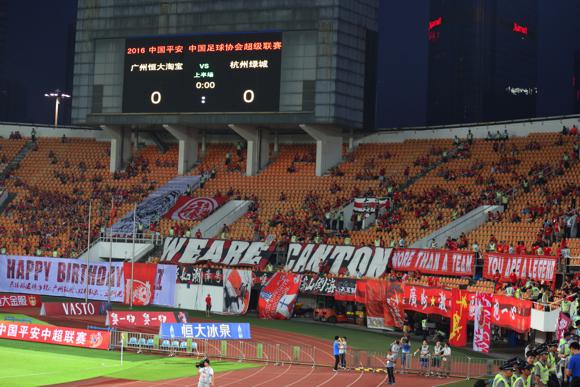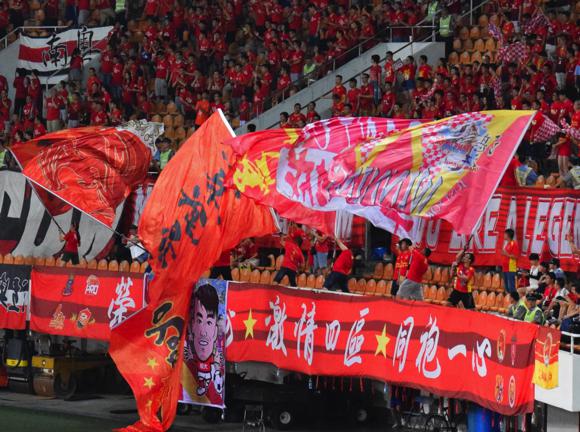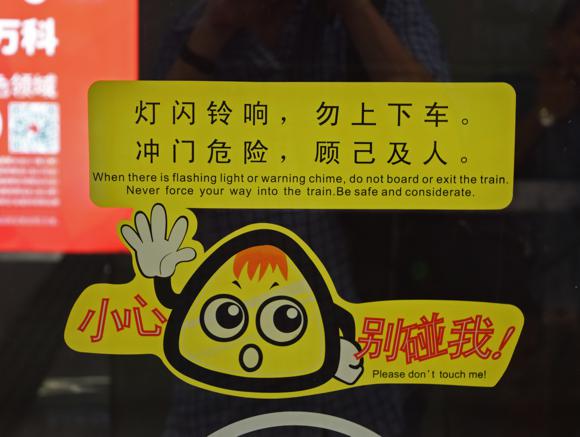Trumpeted by the humungous sums spent this winter on foreign stars and their salaries, the 2017 Chinese Super League kicks off on 3 March. So what will it be like for Tevez, Oscar and company? Nick Rider takes in a match at current champions Guangzhou Evergrande Taobao.
China is coming. The winter sales of Oscar to Shanghai SIPG for €70 million and Carlos Tevez to city rivals Shanghai Shenhua for a world-record salary of around €700,000 per week broke last year’s record signings of Jackson Martínez, Alex Teixeira, Hulk and others. Traffic in managers has been no less frantic or lucrative. André Villas-Boas and Gus Poyet have now joined Manuel Pellegrini, Fabio Cannavaro and Luiz Felipe Scolari in charge of Chinese Super League (CSL) clubs, following in the steps of Sven-Göran Erikson and Marcello Lippi.

In football’s old homelands, Arsène Wenger and others have expressed their concerns on the potential effect of apparently limitless CSL cash on Europe’s top leagues, most notably the English Premier. Top Brazilian clubs have already lost 30 star names, players still in their prime, to China.
While its rise has been meteoric, for many the CSL is a list of exotic names, its actual football a mystery.
Professional football has existed in China since 1994, the CSL since 2004. The Chinese may have been slow to create a modern-day structure around their domestic game but their love of gambling is age-old. After a series of match-fixing scandals, followed by the inevitable arrests and purges, the CSL was last restructured in 2010. Since then it’s been stable – and dominated every year by Guangzhou Evergrande Taobao, the Southern China Tigers.

The only Chinese club to have won the Asian Champions League, in 2013 and 2015, Evergrande are majority-owned by the Evergrande Corporation of Xu Jiayin, China’s second-largest property developer. Look at Guangzhou and its ranks of newly minted, 50-storey apartment blocks disappearing into the smog – that’s Xu Jiayin. For good measure, in 2014 Mr Xu added Taobao to the name of his football club after Jack Ma of Alibaba bought a 38% stake. Ma is the man who brought the Internet to China, his Taobao is the Chinese eBay. Think about it.
It has been said that Guangzhou Evergrande Taobao are already the world’s richest club.
Football also has the immense power of the Chinese state behind it. President Xi Jinping is a fan. His dream, vague but multi-pronged, envisages a newly assertive China taking its proper place in the world, in politics, economics, culture and… football.
His China will qualify regularly for the World Cup, his China will host the World Cup, his China will win the World Cup.
To foster home-grown talent, China has avoided the Qatar route of nationalising foreign players, and imposed tight quotas on CSL imports. Despite this, the national team won’t even reach the next World Cup in Russia, after defeats to Uzbekistan and, incredibly, war-devastated Syria. Italy’s winning coach from 2006, Marcello Lippi has been quickly hired – before a 0-0 draw at home to Qatar.
Lippi’s previous posting was Guangzhou, where he gave way to Luiz Felipe Scolari, Big Phil himself, after 2014.
With even stricter quotas for 2017, CSL clubs may now employ only five foreign players, including at least one from Asia, and field up to three at any one time.
All CSL clubs are spread out between the cities of central and eastern China, a vast area. The longest distance between any two, Guangzhou and Yanbian on the border with North Korea, is nearly 3,500 km, about the same as London to Teheran. With Beijing and the north freezing over in winter, the season runs from March to November. Midsummer matches down south can take place in 35º C heat and 80% humidity.
A typical night at Guangzhou Evergrande, therefore, might see steam rising off the tarmac as you fly in.
For 2017, Evergrande have not matched the Shanghai clubs in making banner acquisitions, courting official favour by proudly announcing their intention to field an all-Chinese team by 2020.
Evergrande play at the Tianhe Stadium, a concrete bowl in a 1980s multi-sports complex, in an affluent part of Guangzhou. Alongside, crowds in Evergrande red and gold gather along the concrete esplanade, among stands selling the ubiquitous Chinese noodles and (very necessary) bottles of water. On the north side of the stadium there’s a whole street of communal table-tennis tables, if you fancy a pre-match warm-up.
By the main entrances, banners in English proclaim the club’s motto: ‘Be the Best Forever’.
Average gates, the highest in the CSL, may only be 45,000 out of a capacity 58,000 – but the fans make every game an experience.
Long before kick-off, the Evergrande end fills with red-clad ranks singing, chanting, waving giant banners and keeping up a constant, booming barrage of cymbals and dragon drums, a distinctly Chinese adaptation of global fan culture. Evergrande fans also have a strange attachment to their city’s name as once given in old Western gazetteers. Giant banners proclaim ‘We are Canton’, alongside slogans such as ‘Always Red’ and ‘Keep Fighting’. Amid unfamiliar tunes, it’s possible to pick out bits of ‘When the Saints…’ or ‘The Red River Valley’, always with jangling Chinese percussion.
There’ll be a brave clutch of long-distance away support at the far end. In this case, it was the green flags of Hangzhou, at 1,000km away then the nearest CSL destination to Evergrande, discounting city rivals Guangzhou R&F, of course. Despite this intrepid following, Hangzhou Greentown were relegated last November.
Over in the Guangzhou end, supporters’ groups launch into rehearsed, synchronised routines. Down the sides, onlookers also join in. The noise level is immense and constant, barring a very proper pause, all standing, for the national anthem.
All this colour and manic fervour make up for the shortcomings of a surprisingly rough and bobbly pitch.
Despite the heat, everything cranks up for kick-off and the game starts at an accordingly frantic pace. Straightforward crosses into the opponent’s box are greeted with oohs and aahs from the home crowd as if halfway-line chips by Pelé. This does little to help a familiar problem in the Chinese game, that old thing called ‘composure’.
Current fan favourites at Guangzhou are 2016 CSL top scorer Ricardo Goulart from Brazil and team captain Zheng Zhi, once of Charlton and Celtic, and key to the club’s previous six title wins. Pin-up boy is Guangzhou’s all-time top scorer, Gao Lin, he of the Ronaldo step-overs.
You’ll see frequent bursts of energy and fine skills but mutual awareness around the pitch may be lacking. As incident and excitement increase, more players fall victim to heat and cramp, and tackles get wilder.
Even after a 0-0 stalemate, which this was, Guangzhou players do a lap of honour as if they’d just won another league title, amid a fresh chorus from the fans.
The standard of football, according to Shanghai-based Cameron Wilson, responsible for the excellent site Wild East Football, ranges between English Premier (Guangzhou) and Leagues 1 or 2 (Hangzhou Greentown). Clearly, Chinese football has a way to go to satisfy its big ambitions – and justify its spending.
In the meantime, sit back and enjoy the show.
Tickets and transport
Without a Chinese credit card, let alone language, online advance booking is out. At Guangzhou, availability on the day isn’t a problem, just pay cash at the ticket offices either side of the stadium, from about three hours before kick-off. Tickets at the Tianhe start at 50 yuan (£6) for sectors 8 and 9 in the corner beside the Guangzhou end (sectors 4-7) and run up to 350 yuan (£40) for the best seats over the halfway line in sector 0. For a seat facing either goal, it’s 150 yuan (£17.50) in sectors 3 and 18, and 200 yuan (£23) in sector 19. At the ticket office, it might be an idea just to write down the sector number you want and price in yuan on a piece of paper and show it to the cashier.
The stadium has its own station, Tianhe Sports Center, on yellow line No.1 of the city’s gleaming metro network, one stop from Guangzhou East station. Buy single tokens from machines at any station, pedantically labelled in English and easy to use. From central Guangzhou, it’s around 3 yuan (35p) to Tianhe.
Bars
The Brit-style Tavern Sports Bar at 6 Hua Jiu Road, Zhu Jiang New Town is a great air-conditioned refuge when the heat and culture shock are getting too much. As a meeting-point for expats who follow Guangzhou Evergrande, it’s also handy for the latest team and ticket information. You’ll find it near Zhujiang New Town metro station where the red No.3 and orange No.5 lines cross, one change/two stops from Tianhe via Tiyu Xilu.
In the mall beneath the stadium, the Tianhe Fashion Plaza has a food court offering a huge array of Chinese food options. Be prepared for a lot of finger-pointing at picture menus – few staff speak English.
Guangzhou Evergrande Taobao v Beijing Gouan, Chinese Super League. 5 March, Tianhe Stadium.







